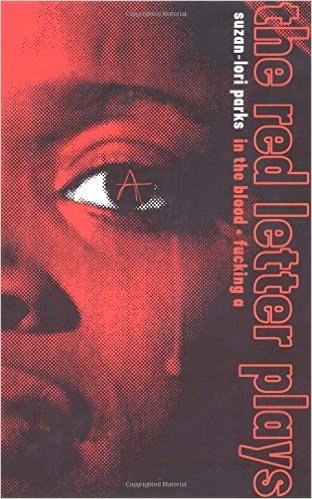Staging a Final Exam: Suzan-Lori Parks’s “In the Blood” as Text and Performance
In the Fall of 2014, I taught ENGL 339: Modern and Contemporary American Literature (one of my favorite courses to teach here at NJCU). For the final exam, students were assigned roles in Suzan-Lori Parks’s “In the Blood.” We had previously done a table reading and discussion of the play, and throughout the semester, connected it to previous literature as well as critical works. Students were encouraged to put the play in conversation with works by Kimberlé Crenshaw Williams, Toni Morrison, June Jordan, and Maxine Hong Kingston, for example, to consider issues such as intersectional identities, power, violence, voice/voicelessness, and the shaping of black women’s lived experiences.
For their final, they were assigned the task of developing a courtroom trial scene for Hester la Negrita. Students were divided into working groups: Prosecution, Defense, Witnesses, Jury. I would serve as facilitator and time-keeper if there were major procedural conflicts or questions. And there was one big catch: this was an open final exam. This meant that we would be inviting members of the campus community to the performance and engage in a conversation about the work that students had done to stage the scene. In other words, it was a ton of work. However, dividing the class into groups and giving them clear assignments, as well as providing them with in-class time to do a run-through and ask questions, helped…I hope.
Once we had our groups, we decided on a focus of the performance and post-performance talk. The audience would ask questions, but the students could also ask audience members questions. I was hoping for a rich exchange that would both demonstrate my students’ skills while allowing them to engage in non-traditional ways for deeper understanding.
We then set up the performance. First, we invited individuals from several departments and campus groups (the offer of refreshments helps get a nice group out for an 8 a.m. final). I developed a flyer for the event and sent letters explaining what we would be doing. Our guests showed up–and provided a supportive and encouraging atmosphere for my students, who were nervous as heck. But…they were incredibly prepared. And brilliant. I’m pretty sure I went home and cried with joy. It was in this moment that I saw the wonderful depth of student talent that exists at NJCU. They didn’t just show up to “act”; they researched state laws for each of the charges brought against Hester; they argued passionately; the jury deliberated seriously, listened to the evidence presented, and asked questions when they were unsure. They applied a critical race theoretical lens to the materials. Hester assisted in her defense. The witnesses were forthright (and appropriately shame-faced). We provided handouts for the guests to participate as the chorus and supplied them with a reading list.
The guests who attended my students’ final were enthusiastic and supportive–and asked lots of questions. I have reams of notes from the rapid-fire exchanges between the lead prosecutor and defense attorney. They were way better than any episode of Law and Order I’ve ever seen.
This class transformed me in so many ways. I cannot wait to see what future students have in store for me.

